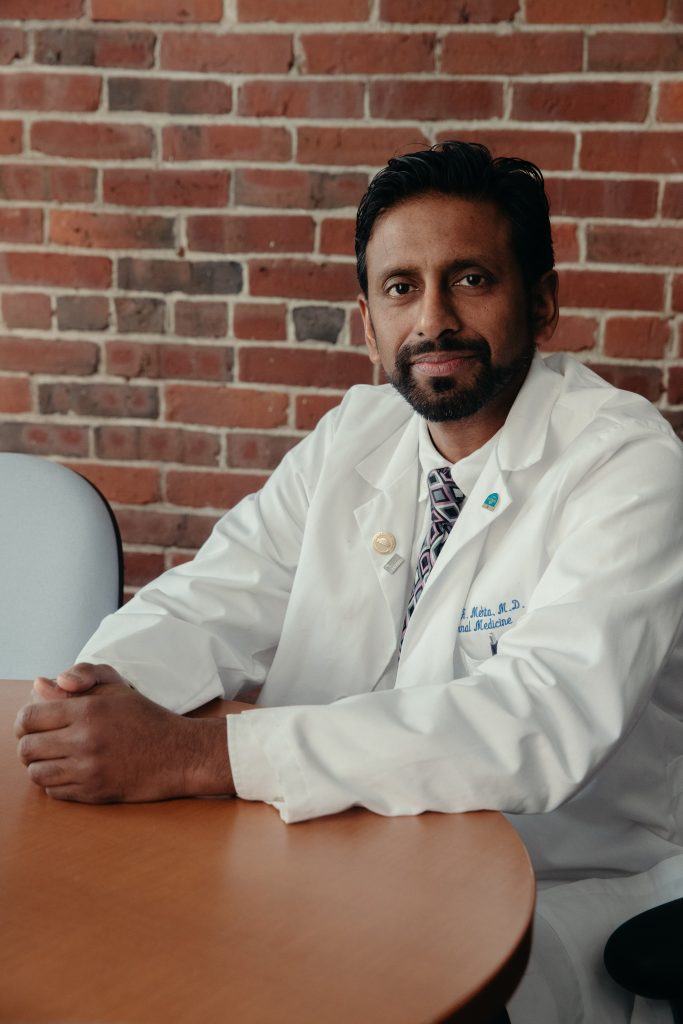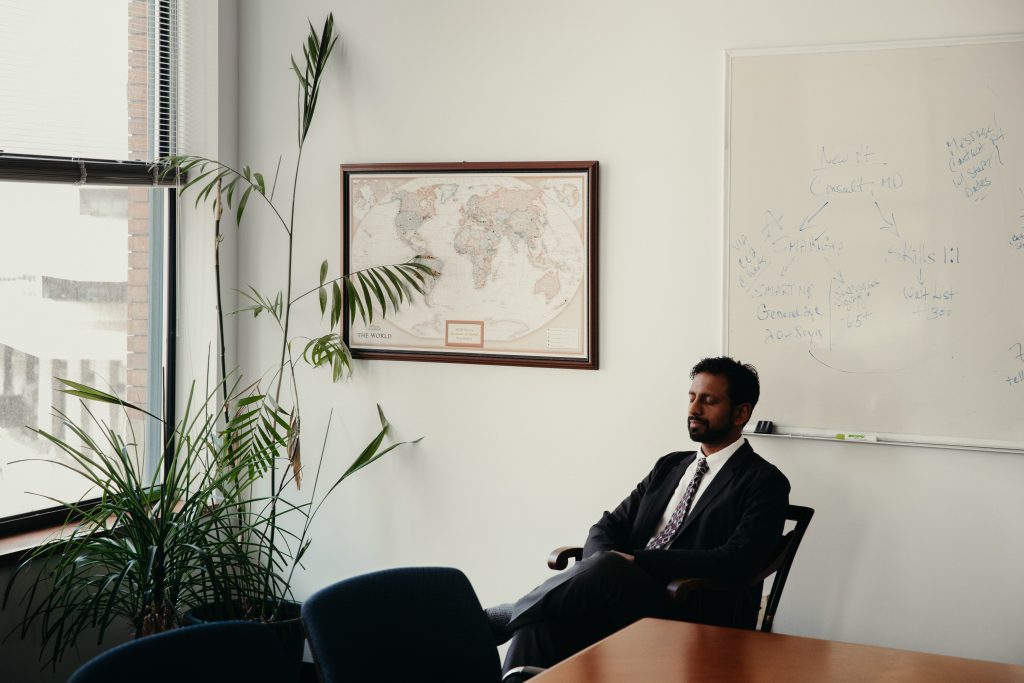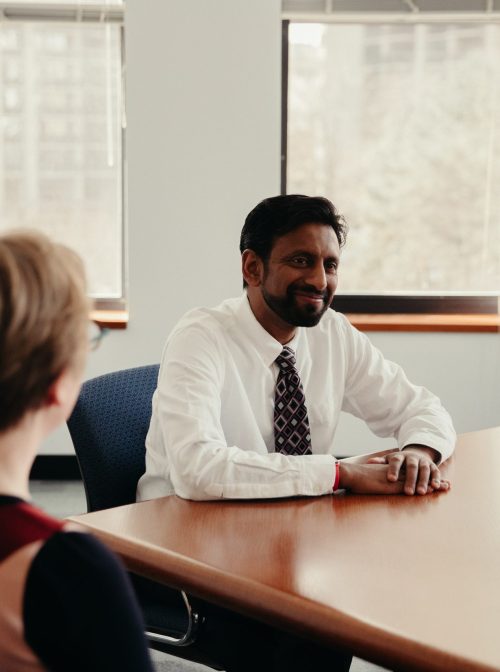Twice each week, on Monday and Wednesday mornings, stressed-out staff members at Massachusetts General Hospital in Boston settle in front of their computers and join an online meditation session. The calming, centering ritual offers an oasis in time for busy health care workers to relax and recharge, and dozens return to the sessions each week.
It’s not surprising that such a class exists — healthcare is a taxing field, and studies show that the COVID-19 pandemic has left record numbers of medical professionals feeling depressed, anxious and adrift. But this class is something special: The leader, Dr. Darshan Mehta, is an assistant professor of medicine at Harvard Medical School and the medical director of the Benson-Henry Institute for Mind Body Medicine at Massachusetts General Hospital. Dr. Mehta’s personal life is characterized by what he calls “religious hybridity” — in his case, an intimate familiarity with the philosophies and practices of Dharmic religious traditions. He’s also studied the science that proves what many of us see as common knowledge: Our minds and bodies are profoundly intertwined, and practices like meditation can reduce stress and improve quality of life.

This wasn’t always the accepted wisdom, especially in medical circles. Just a generation ago, Dr. Herbert Benson was a pioneer in documenting what he termed the “relaxation response,” the mind-body connection that showed how stress can literally make people sick.
Benson established the Benson-Henry Institute, also known as BHI, to continue this research and integrate its wisdom into medical training and patient care. Dr. Mehta’s role involves far more than meditation classes. He sees himself as wearing “five hats,” and in addition to being a father, he moves through his professional day teaching medical students, consulting with colleagues and patients, and serving as education director of the Osher Center for Integrative Medicine.
He takes patient’s religious beliefs and practices seriously, in part because studies show that when doctors take time to show care, it leads to better results for their patients.
In medicine, “you have to have an ability to connect, whether it’s through their faith tradition or other cultural dimensions.”
“I think in medicine, particularly, diversity is important. One of the predictors of success of treatment is when there is good connection with the person who is in front of you,” Dr. Mehta says. “You have to have an ability to connect, whether it’s through their faith tradition or other cultural dimensions. There is trust built in the relationship so that you can actually have the best possible health outcome.”
Dr. Amit A. Shah, a geriatrician and an associate dean at the Mayo Clinic Alix School of Medicine in Scottsdale, Arizona, is one of Dr. Mehta’s closest friends. Dr. Shah says the BHI’s groundbreaking work showing the connection between stress and health now “seems obvious, but sometimes you have to prove the obvious.”
“He’s looking for the holistic approach, really helping people connect the dots and getting them to that deeper level of understanding that many of our illnesses have mind-body connections,” Dr. Shah said. “What Dr. Mehta does is really help patients … understand that this is not some hand waving, New Age, hippie thing, which is how people might have received it in the 60s and 70s,” Dr. Shah said. “It actually has a lot of science around it.”
Before Dr. Mehta became a renowned expert in integrative medicine, before he became a father, before he had the stethoscope and white coat, before he’d even heard the term “mind body medicine,” he was a kid growing up in suburban Illinois. His parents immigrated to the U.S. from India when he was an infant, and they raised him with an appreciation for Dharmic religions.
Born to a Jain family, Dr. Mehta was influenced and inspired by the principles of Jainism, a 2,500-year-old non-theistic tradition with relatively few adherents (fewer than 1% of India’s 900 million people are Jain) but a significant impact in India and far beyond. Mahatma Gandhi, a Hindu and Jain, was profoundly inspired by the Jain principle of ahimsa, non-violence, as was the Rev. Martin Luther King Jr., and Dr. Mehta practices vegetarianism as an extension of this ethic.
Jainism isn’t the only Dharmic tradition that impacted him, however. Dr. Mehta’s parents, arriving in the U.S. when there were very few Jain temples and community centers, were also inspired by the Hindu spiritual teacher Pandurang Shastri Athavale, a leader who espoused a philosophical teaching of self-knowledge, love and respect for all. In 1997, Athavale was honored with the Templeton Prize for Progress in Religion. After graduating from college and before they went off to medical school, Dr. Mehta and Dr. Shah spent a year studying together with an international group of students at Athavale’s ashram in India.
“I had this really spectacular year. That was very influential. I do attribute the work I do today to the seeds that were planted,” in those early experiences, Dr. Mehta says. “I just didn’t know it at the time.”
His religious practices today are characterized by fluidity, as he moves comfortably between Jainism, Hinduism and Buddhism, a tradition that inspires the meditation sessions he leads with colleagues. He’s attended Buddhist meditation retreats and also studied with Dr. Benson, who did research on the positive impacts of transcendental meditation.

“Thinking about caring for our own, caring for the caregiver” is one of his passions, Dr. Mehta says. A few months before the pandemic set in, he delivered a lecture on the topic to his colleagues in Boston-area hospitals, and he watched the sense of loss and despair become more acute as the COVID-19 surged. He’s heard many caregivers “sort of feel like a cog in this wheel, sort of a hamster doing a set of tasks, and at the end of the day, what are we achieving?”
“People are leaving the profession, either willingly, or often, in the most tragic way. Many people are keenly aware that physicians die by suicide at double the rate of the population,” Dr. Mehta says. One his passions, in addition to consulting and teaching, is to address this “subspace of meaning and purpose” among healthcare providers.
When he reflects on his place in the diverse American religious landscape, and among Asian American Pacific Islanders specifically, Dr. Mehta says he often feels unique. His ease with different traditions means he doesn’t fit neatly in any category.
“There are very few people like that, where you can flow between,” he says. Many people “are very attached to a particular identity.”
At the same time, he sometimes feels distinct from other second-generation South Asian Americans who turn to religious institutions more for community and culture than for Dharmic wisdom.
His friend, Dr. Shah, says this might be changing. At the Mayo Clinic medical school, he sees students who follow a single religion in a traditional way, but he also notices many others who comfortably go to yoga, practice meditation and go to church on Sundays — and usually one they’ve chosen, not the one they attended with their parents. “You certainly see a little bit less desire to be stuck in one box and have a dark line around it,” Dr. Shah says.

Dr. Mehta says he’s noticed that practitioners of Dharmic traditions in the United States, including those in his generation, have been more hesitant to speak up about their faith — few ask for holidays off from work, for example. He also feels that the South Asian religious communities could be more profoundly and publicly philanthropic, drawing lessons from those who, inspired by other religious faiths, have used their wealth to build hospitals and endow professorships, for example. The South Asian religious communities have great giving potential, he says. He also believes their wisdom traditions can profoundly impact American culture in a way that goes far beyond meditation and yoga classes.
“I think one of the powers I see in many of the South Asian traditions, if you really study them deeply, is they’re really meant to be very inclusive of all of humanity,” Dr. Mehta says. Dharmic traditions “really appreciate the diversity of worldviews around meaning and purpose in life. I do think there’s a ripe opportunity for having a significant voice of inclusivity and dialogue that I’m hopeful for.”
“One of the powers I see in many of the South Asian traditions … is they’re really meant to be very inclusive of all of humanity.”
Dr. Shah agrees. He’s already seen the impact Dr. Mehta has had on his own life.
“It’s really been fun being Darshan’s friend for so many years. It is a journey. To have walked alongside him, to have experienced the Jain tradition in a way that I never would have — the nonviolence tradition of Jainism, which Mahatma Gandhi exemplifies, that’s all from Jainism. I used to eat meat until Darshan was my friend, and then he kept (discussing it), in gentle way,” Dr. Shah says. “It took seven years, but that was a present to him, not to anybody else. Despite me being Hindu where vegetarianism is common, I’m vegetarian because of him, and because of Jainism, and the way he incorporated it in his life.”
The impact was mutual. Dr. Shah also saw Dr. Mehta take a keen interest in his Hindu traditions and teachings. “We kind of walked alongside each other.”
READ THE SERIES
Exploring AAPI Experiences of Religious Identity and Diversity

This article is part of Interfaith America’s AAPI qualitative research and storytelling initiative, which explores Asian American and Pacific Islanders’ experiences of religious identity and diversity in the United States. Stories published as part of this initiative offer key findings from the research and spotlight AAPI changemakers across different religious, civic, and professional sectors.




